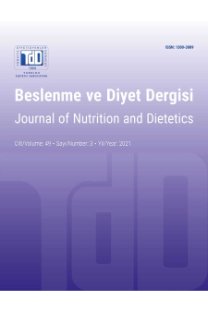Erkek İnfertilitesinde Antioksidanların Rolü
The Role of Antioxidants in Male Infertility
___
- Vayena E, Rowe PJ, Griffin PD. Current practices and controversies in assisted reproduction. Geneva: World Health Organization. 2002:15-21.
- Aşçı R, Açıkgöz A. Varikosel: İnsidans, etiyoloji ve fizyopatoloji. Türkiye Klinikleri J Urology-Special Topics 2012;5(3):6-15.
- Yeni E, Erel Ö, Ünal D et al. Anestezi çalişanlarinda semen analizi parametreleri ve seminal plazma oksidatif stres arasi ilişki. Turk J Urol 2004;30(1):58-62.
- Güngör I. İnfertil çiftlerde sağlıklı yaşam biçimi davranışları geliştirme ve hemşirenin rolü. İnfertilite Hemşireliği (Infertilty Nursing). İstanbul: Acar Basımevi; 2009. p.163-76.
- Braga DP, Halpern G, Figueira RC. Food intake and social habits in male patients and its relationship to intracytoplasmic sperm injection outcomes. Fertil Steril 2012;97(1):53-59.
- Chavarro JE, Rich-Edwards JW, Rosner BA, Willett WC. Caffeinated and alcoholic beverage intake in relation to ovulatory disorder infertility. Epidemiology 2009;20(3):374.
- Demirci N. Erkek fertilitesi ve riskli yaşam biçimi davranışları. FNJN 2014;22(1):39-45.
- Eslamian G, Amirjannati N, Rashidkhani B, Sadeghi MR, Hekmatdoost A. Intake of food groups and idiopathic asthenozoospermia: a case–control study. Hum Reprod 2012;27(11):3328-3336.
- Dacheux J-L, Dacheux F. New insights into epididymal function in relation to sperm maturation. Reproduction 2014;147:R27–R42.
- GharagozlooP,Aitken RJ. The role of sperm oxidative stress in male infertility and the significance of oral antioxidanttherapy.Hum Reprod2011;26:1628–1640.
- WongWY,ThomasCM,MerkusJM,ZielhuisGA,Steegers- TheunissenRP.Male factor subfertility: possible causes and the impact of nutritional factors.FertilSteril 2000;73(3):435-442. Mora-Esteves C, Shin D. Nutrient supplementation: improving male fertility fourfold. Semin Reprod Med 2013;31:293–300.
- MostafaT,AnisT,Imam H, El-Nashar AR, Osman IA, et al. Seminal reactive oxygen species-antioxidant relationshipinfertilemaleswithandwithoutvaricocele. Andrologia2009;41:125–129
- Balercia G, Mancini A, Tirabassi G, Pontecorvi A. Coenzyme Q10 in male infertility, in antioxidantsin andrology. Cham: Springer International Publishing; 2017.p.43-57.
- Vahidinia A, Rahbar AR, Shakoori M,Mohammad M. Effect of astaxanthin, vitamin E, and vitamin C in combination with calorie restriction on sperm quality and quantity in male rats. J Diet Suppl2016:1-12.
- Agarwal A, Sekhon LH. The role of antioxidant therapy in the treatment of male infertility. HumFertil(Camb) 2010;13(4):217-225.
- AkmalM,QadriJQ,Al-WailiNS.Improvementinhuman semenqualityafteroralsupplementationofvitaminC.J MedFood2006;9(3):440-442.
- Dawson EB, HarrisWA,Teter MC, Powell LC. Effect of ascorbic acid supplementation on the sperm quality of smokers.FertilSteril1992;58(5):1034-1039.
- WangYX,YangSW,QuCB.L-carnitine:safeandeffective for asthenozoospermia. National Journal of Andrology 2010;16(5):420-422.
- VitaliG,ParenteR,MelottiC.Carnitinesupplementation in human idiopathic asthenospermia: clinical results. Drugs Exp Clin Res1994;21(4):157-159.
- Rolf C, Cooper TG,YeungCH, Nieschlag E. Antioxidant treatment of patients with asthenozoospermia or moderate oligoasthenozoospermia with high-dose vitamin C and vitamin E: a randomized, placebo- controlled, double-blindstudy.Hum Reprod 1999;14(4):1028-1033.
- Alizadeh F, Javadi M, Karami AA, Gholaminejad F, Kavianpour M, Haghighian HK. Curcumin nanomicelle improves semen parameters, oxidative stress, inflammatory biomarkers, and reproductive hormones in infertile men: A randomized clinical trial. Phytother Res2018;32(3):514-521.
- Hammoud AO, MeikleAW,Peterson CM. Association of 25-hydroxy-vitamin D levels with semen and hormonal parameters. Asian J Androl2012;14(6):855-859.
- LenziA,LombardoF,SgròP.Useofcarnitinetherapyin selected cases of male factor infertility: a double-blind crossover trial. Fertil Steril2003;79(2):292-300.
- Mohammad K, MoslemiST.Selenium–vitamin E supplementation in infertile men: effects on semen parameters and pregnancy rate. IJGMP2011;4:99-104.
- Eskenazi B, Kidd SA, Marks AR. Antioxidant intake is associated with semen quality in healthy men.Hum Reprod2005;20(4):1006-1012.
- Montanino Oliva M, Minutolo E, Lippa A, IaconianniP,Vaiarelli A. Effect of myoinositol and antioxidants on sperm quality in men with metabolic syndrome. Int J Endocrinol2016;2016:1674950.
- Safarinejad MR. Safety and efficacy of coenzyme Q10 supplementation in early chronic Peyronie’s disease: a double-blind, placebo-controlled randomizedstudy.Int J Impot Res2010;22(5):298-309.
- Safarinejad MR. Efficacy of coenzyme Q10 on semen parameters,spermfunctionandreproductivehormones in infertile men. J Urol2009;182(1):237-248.
- Safarinejad MR, Safarinejad S, Shafiei N, Safarinejad S. EffectsofthereducedformofcoenzymeQ10(ubiquinol) on semen parameters in men with idiopathicinfertility: a double-blind, placebo controlled, randomizedstudy.J Urol2012;188(2):526-S31.
- Condorelli RA, La Vignera S, Di Bari F, UnferV,Calogero AE. Effects of myoinositol on sperm mitochondrial function in-vitro. Eur Rev Med Pharmacol Sci 2011;15(2):129-134.
- CondorelliRA,LaVigneraS,BellancaS,VicariE,Calogero AE. Myoinositol: does it improve sperm mitochondrial function and sperm motility? J Urol 2012;79(6):1290- 1295.
- Ali YF, Desouky OS, Selim NS, Ereiba KM. Assessment of the role of a-lipoic acid against the oxidative stress of induced iron overload. J Radiat Res Appl Sci 2015;8:26– 35.
- Haghighian HK, Haidari F, Mohammadi-Asl J,Dadfar M. Randomized, triple-blind, placebo-controlled clinical trial examining the effects of alpha-lipoic acid supplementonthespermatogramandseminaloxidative stress in infertile men.FertilSteril2015;104(2):318-324.
- Nadjarzadeh A, Shidfar F, Amirjannati N,VafaMR, Motevalian SA, Gohari MR, et al. Effect of Coenzyme Q10 supplementation on antioxidant enzymes activity and oxidative stress of seminal plasma: a double-blind randomised clinical trial. Andrologia 2014;46(2):177- 183.
- Türk S, Mändar R, Mahlapuu R, Viitak A,Punab M, Kullisaar T. Male infertility: decreased levels of selenium, zinc and antioxidants. J Trace Elem Med Biol 2014;28(2):179-185.
- Mendiola J, Torres-Cantero AM, Vioque J, Moreno-Grau JM,TenJ, Roca M. A low intake of antioxidant nutrients is associated with poor semen quality inpatients attending fertility clinics. Fertil Steril 2010;93(4):1128- 1133.
- Nadjarzadeh A, Mehrsari A, Mostafavi E, Gohari MR, Shidfar F. The association between dietary antioxidant intake and semen quality in infertile men. Med J Islam Repub Iran2013;27(4):204-249.
- ISSN: 1300-3089
- Yayın Aralığı: Yılda 3 Sayı
- Başlangıç: 1972
- Yayıncı: Türkiye Diyestisyenler Derneği
Crohn Hastalığında Gelişen Komplikasyonlara Göre Değişen Tıbbi Beslenme Tedavisi: Bir Olgu Sunumu
Alkol ve Madde Bağımlılığı Olan Bireylerde İştah, Beslenme Durumu ve Yaşam Kalitesi İlişkisi
ÖZGE KÜÇÜKERDÖNMEZ, MURAT URHAN, EDA KÖKSAL
Kadın Tüketicilerde Besin Etiketi Okuma Alışkanlıkları ve Alerjen Bilgi Düzeyinin Saptanması
Ezgi Bellikci KOYU, Zehra BÜYÜKTUNCER DEMİREL
Yatarak Kemoterapi Alan Pediatrik Onkoloji Hastalarında Oral Mukozit Gelişiminin Beslenmeye Etkisi
Şeniz ÖZTÜRK, HİLAL SUSAM ŞEN, Canan AKYÜZ, HÜLYA GÖKMEN ÖZEL
Selda ÇELİK, Cemile İDİZ, Elif BAĞDEMİR, Sevim PURİSA, Nevin DİNÇÇAĞ, İLHAN SATMAN
Hurmanın (Phoenix dactylifera) Bileşimi ve Antioksidan Özellikleri
İnsülin Direncine Etki Eden Besinler
ÖZLEM ÇETİNER, NESLİŞAH RAKICIOĞLU
Üniversite Öğrencilerinde Kronotipe Göre Besin Tüketiminin Değerlendirilmesi
